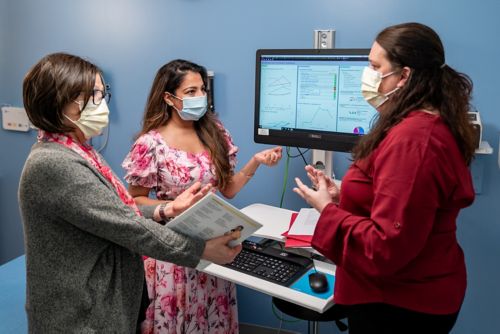St. Jude Family of Websites
Explore our cutting edge research, world-class patient care, career opportunities and more.
St. Jude Children's Research Hospital Home

- Fundraising
St. Jude Family of Websites
Explore our cutting edge research, world-class patient care, career opportunities and more.
St. Jude Children's Research Hospital Home

- Fundraising
Nidhi Bhatt, MD
Evaluating health literacy and developing health care communication programs for adolescents with bleeding disorders
Overview
Health literacy is critical for patients to access and understand health-related information and use that information to make informed decisions. My research focuses on the health literacy and neurocognition of adolescent patients with hemophilia and creating educational materials for a global audience that explain complex treatments like gene therapy.

Research Summary
My primary area of research centers on effective health care communication and patients’ health literacy. As a hematologist, I am exploring health communication among adolescents living with bleeding disorders, particularly hemophilia, since previous research revealed that many of these patients might have learning disabilities and ADHD.
This research line involves assessing a patient’s health literacy and neurocognition through a collaborative effort with the Department of Psychology at St. Jude. Our project, called HEMOCOG, examines the cognition, health literacy, transition readiness and educational experience of St. Jude patients with hemophilia. Armed with a better understanding of their health literacy, we aim to ultimately create patient education materials that are understandable, accurate and easy for them to access.

My efforts extend beyond the health literacy of our hemophilia patients, bringing effective health communications to the global stage. As part of the St. Jude Global initiative and the Blue-Sky–funded initiative, Global Hemophilia Gene Therapy Trial, my colleagues and I aim to better understand and remedy any disconnections in health care communication. We aim to create patient-friendly and accessible educational materials globally that explain complex treatments like gene therapy, so patients and health care providers can make shared decisions on appropriate treatments and care.
In addition to my research on effective health communication, I am collaborating with colleagues in St. Jude’s Gynecology Clinic to develop an improved standardized approach to caring for pre-adolescent girls with iron deficiency, anemia and bleeding disorders. We have created a multidisciplinary clinic called the EAGER clinic that includes physicians from Hematology and Gynecology as well as nutritionists, social workers, child life specialists, genetic counselors, and other specialists to empower girls living with these conditions. Multiple federally funded hemophilia treatment centers nationwide are contributing to our project.
In addition to my clinical and research work, I am heavily involved in trainee education and serve as the associate program director of the Pediatric Hematology-Oncology Fellowship Program at St. Jude.
Selected Publications
About Dr. Bhatt
Dr. Nidhi Bhatt earned her BS in Biology from the University of Illinois. She ventured abroad to India to pursue her passion for medicine and obtained her MD from Kasturba Medical College. She returned to the University of Illinois to complete her post-graduate research. From there, she put her medical knowledge into practice at her pediatric residency at Southern Illinois University. Interested in specializing further, Dr. Bhatt completed a pediatric hematology/oncology fellowship at Rush University Medical Center. She is currently an Assistant Member at St. Jude, where she focuses her research on health communications for adolescent bleeding disorder patients.

Affiliations and Collaborations
Contact us
Nidhi Bhatt, MD
Instructor
Department of Hematology
MS 800, Room R5004
St. Jude Children's Research Hospital
Follow Us

Memphis, TN, 38105-3678 USA GET DIRECTIONS